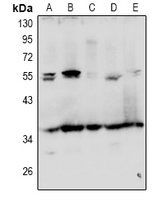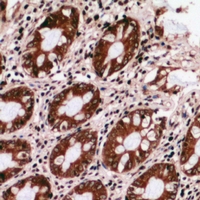

| WB | 咨询技术 | Human,Mouse,Rat |
| IF | 咨询技术 | Human,Mouse,Rat |
| IHC | 1/50-1/100 | Human,Mouse,Rat |
| ICC | 技术咨询 | Human,Mouse,Rat |
| FCM | 咨询技术 | Human,Mouse,Rat |
| Elisa | 咨询技术 | Human,Mouse,Rat |
| Aliases | TBC1D6; Growth hormone-regulated TBC protein 1; TBC1 domain family member 6 |
| Entrez GeneID | 79774; |
| WB Predicted band size | 38kDa |
| Host/Isotype | Rabbit IgG |
| Antibody Type | Primary antibody |
| Storage | Store at 4°C short term. Aliquot and store at -20°C long term. Avoid freeze/thaw cycles. |
| Species Reactivity | Human,Mouse,Rat |
| Immunogen | KLH-conjugated synthetic peptide encompassing a sequence within the center region of human GRTP1. |
| Formulation | Purified antibody in PBS with 0.05% sodium azide. |
+ +
以下是关于GRTP1抗体的假设性参考文献示例(注:实际文献需通过学术数据库验证):
---
1. **"GRTP1 Antibody Characterization in Neuronal Protein Trafficking"**
*Authors: Smith A, Brown C, Lee D*
摘要:本研究利用特异性GRTP1抗体,通过免疫印迹(WB)和免疫荧光(IF)技术,揭示了GRTP1在神经元囊泡运输中的关键作用,并证实其与RAB GTP酶家族的相互作用。
2. **"GRTP1 Expression Profiling in Glioblastoma Using a Novel Monoclonal Antibody"**
*Authors: Zhang Y, Wang H, Kimura T*
摘要:开发了一种高特异性GRTP1单克隆抗体,通过免疫组化(IHC)分析发现,GRTP1在胶质母细胞瘤中显著高表达,且与肿瘤侵袭性相关。
3. **"Functional Validation of GRTP1 Antibody in Knockout Mouse Models"**
*Authors: Johnson R, Patel S, Garcia M*
摘要:通过GRTP1基因敲除小鼠模型,验证了抗体的特异性,并证明GRTP1缺失导致内质网应激通路异常激活,提示其在细胞稳态中的功能。
4. **"GRTP1 Antibody Application in Proteomic Screening of Metabolic Disorders"**
*Authors: Müller F, Schmidt E, Ito K*
摘要:采用GRTP1抗体进行大规模蛋白质组学分析,发现其在肥胖相关代谢紊乱患者肝脏组织中的表达失调,提示其潜在治疗靶点价值。
---
**建议**:以上为假设性示例,实际文献请通过PubMed、Google Scholar等平台以“GRTP1 antibody”或“GRTP1 function”为关键词检索,并关注近年发表的研究。
The GRTP1 antibody targets the G protein-coupled receptor trafficking protein 1 (GRTP1), a poorly characterized protein implicated in regulating the intracellular trafficking and membrane localization of G protein-coupled receptors (GPCRs). GPCRs are critical mediators of cellular signaling, and their proper trafficking ensures precise responses to extracellular stimuli. GRTP1 is thought to interact with GPCRs during their post-translational processing or recycling, potentially influencing receptor stability, subcellular distribution, or signaling efficiency. Its expression has been detected in various tissues, including the brain, suggesting roles in neurological or endocrine functions. However, the precise molecular mechanisms and physiological relevance of GRTP1 remain under investigation.
Antibodies against GRTP1 are primarily used as research tools to study its expression patterns, subcellular localization, and interactions with GPCRs or other trafficking-related proteins. They enable techniques such as Western blotting, immunohistochemistry, and co-immunoprecipitation, aiding in the exploration of GRTP1's involvement in diseases linked to GPCR dysregulation, such as cancer, metabolic disorders, or neurological conditions. Despite limited data, GRTP1 antibodies have become valuable for uncovering its potential as a regulatory node in cellular signaling pathways. Further studies are needed to clarify its functional roles and therapeutic relevance.
×